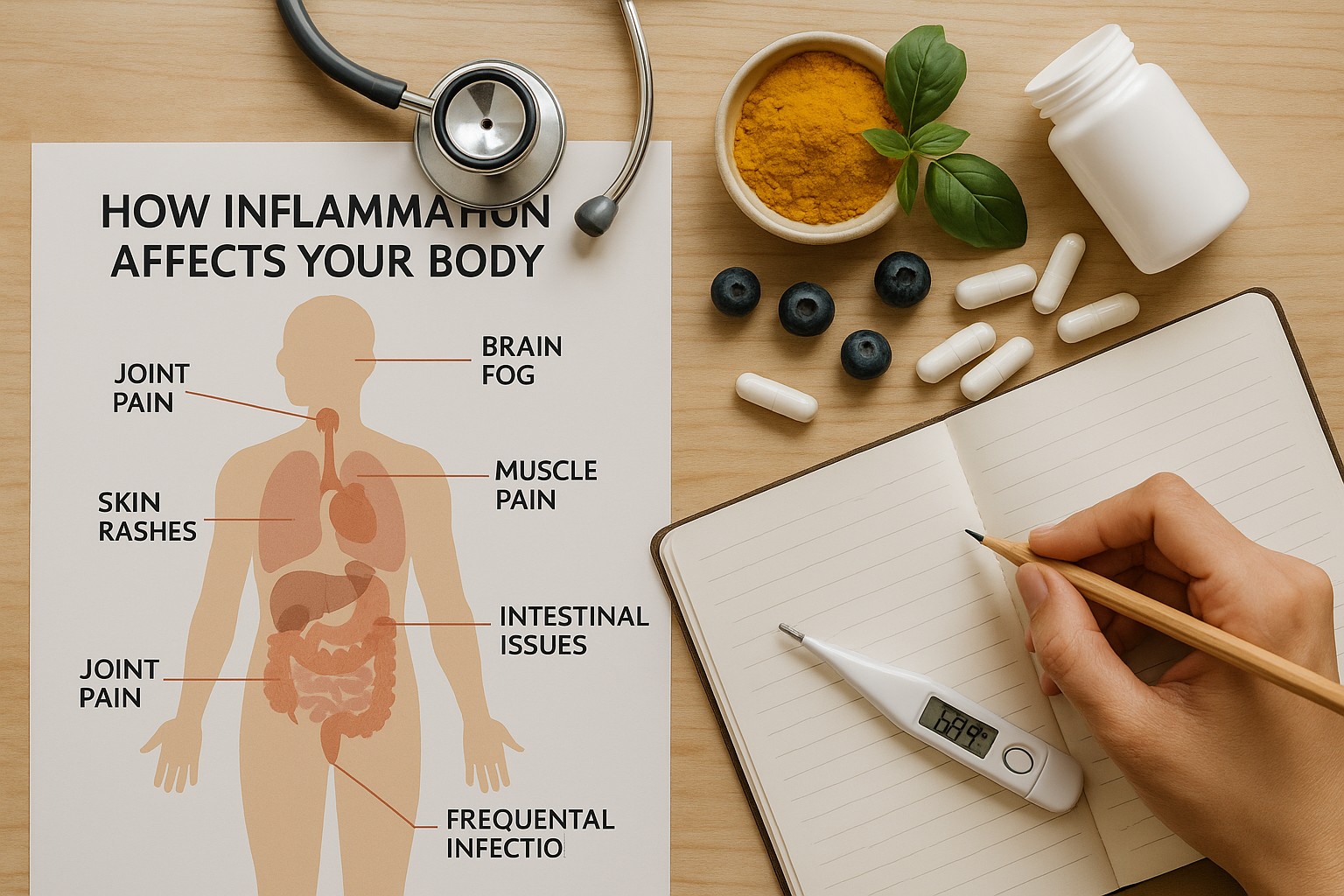What Is Inflammation?
Inflammation is your body’s natural defense system. When you’re injured or sick, the immune system triggers inflammation to fight infection, remove damaged cells, and initiate healing.
But there are two types:
-
Acute inflammation – short-term, like redness or swelling after a cut.
-
Chronic inflammation – long-term, low-grade, often invisible, but highly destructive.
Chronic inflammation is triggered by modern lifestyle factors and can silently attack your tissues, organs, and cells.
The Role of Inflammation in the Body
In small doses, inflammation helps:
-
Heal wounds
-
Fight pathogens
-
Clear out toxins
But when it lingers, it becomes toxic:
-
Inflammatory markers like CRP (C-reactive protein), IL-6, and TNF-alpha increase.
-
Oxidative stress rises, damaging cells and accelerating aging.
-
Tissue breakdown begins, affecting muscles, joints, brain, and organs.
It’s the hidden thread linking many chronic diseases—even when no symptoms are obvious at first.
21 Ways Chronic Inflammation Damages Your Body
-
Joint Pain and Swelling – As seen in arthritis.
-
Persistent Fatigue – Energy depletion from overactive immune signals.
-
Brain Fog – Reduced mental clarity due to neuroinflammation.
-
Digestive Bloating – Caused by gut inflammation and leaky gut.
-
Skin Issues – Eczema, acne, and psoriasis linked to immune dysregulation.
-
Muscle Weakness – Chronic pain and breakdown of tissue.
-
Autoimmune Reactions – Body attacks its own tissues.
-
Insulin Resistance – Raises risk of prediabetes and diabetes.
-
Depression and Anxiety – Inflammatory cytokines affect neurotransmitters.
-
Allergies and Asthma – Heightened immune sensitivity.
-
Poor Sleep Quality – Inflammation disrupts melatonin and circadian rhythm.
-
Hair Thinning – Chronic inflammation stunts follicle function.
-
Recurring Infections – Weakened immune regulation.
-
Gut Microbiome Disruption – Dysbiosis and inflammation feed each other.
-
Hormonal Imbalances – Impacts thyroid, estrogen, cortisol, and testosterone.
-
Elevated Blood Pressure – Arterial stiffness and inflammation.
-
Heart Disease – Inflammation damages arterial lining.
-
Stubborn Weight Gain – Especially around the belly.
-
Increased Cancer Risk – Chronic cell turnover raises mutation potential.
-
Accelerated Aging – Inflammatory molecules age the body faster.
-
Reduced Organ Function – Liver, kidneys, lungs suffer over time.
How Inflammation Leads to Disease
Many of today’s most debilitating diseases are now linked to long-term inflammation. It doesn’t just cause discomfort—it lays the groundwork for serious illness.
1. Heart Disease
Chronic inflammation damages artery walls, encourages plaque buildup, and makes it easier for clots to form—leading to heart attacks and strokes.
2. Type 2 Diabetes
Inflammatory markers interfere with insulin signaling, making it harder for cells to absorb glucose, leading to elevated blood sugar levels.
3. Alzheimer’s and Cognitive Decline
Neuroinflammation is now considered a major contributor to memory loss, brain shrinkage, and the buildup of amyloid plaques.
4. Arthritis
Autoimmune conditions like rheumatoid arthritis are classic examples of inflammatory disease—where the immune system attacks joints.
5. Depression
Scientists have found that individuals with high levels of cytokines often suffer from persistent low mood, hinting at an inflammation-depression loop.
These connections reveal inflammation as the common thread weaving together modern chronic illnesses.
Common Inflammation Triggers in Daily Life
Inflammation often begins subtly—through everyday habits we may overlook:
-
Highly Processed Foods: Refined sugars, trans fats, and additives are pro-inflammatory.
-
Lack of Sleep: Poor sleep increases cortisol and disrupts immune balance.
-
Sedentary Lifestyle: Physical inactivity leads to metabolic stagnation and increased inflammatory markers.
-
Chronic Stress: Cortisol imbalance drives inflammatory cytokine production.
-
Environmental Toxins: Air pollution, plastics, heavy metals, and even mold can trigger low-grade inflammation.
Being aware of these hidden causes is the first step in reducing the burden on your body.
Testing and Diagnosing Inflammation
Inflammation isn’t always visible, so doctors rely on specific blood markers to assess its presence:
-
CRP (C-reactive protein) – Most common general inflammation marker.
-
ESR (Erythrocyte Sedimentation Rate) – Indicates systemic inflammation.
-
Interleukins and Cytokines (e.g., IL-6, TNF-alpha) – Measured in specialized labs.
-
Homocysteine and Ferritin – Can also indicate underlying inflammation.
These tests, combined with symptoms and lifestyle history, help create a clearer health picture.
Anti-Inflammatory Lifestyle Changes
Reducing inflammation doesn’t require radical changes—it begins with simple, consistent actions:
-
Diet: Eat whole foods rich in antioxidants. Limit sugar, processed meats, and seed oils.
-
Exercise: Moderate daily movement (like walking, yoga, resistance training) helps reduce inflammation.
-
Sleep: Aim for 7–9 hours of uninterrupted sleep each night.
-
Stress Reduction: Meditation, journaling, nature walks, and deep breathing can lower cortisol.
-
Gut Support: Incorporate prebiotics, probiotics, and fermented foods.
Together, these changes can quiet the inflammatory noise and support long-term healing.
Top Foods That Fight Inflammation Naturally
Your kitchen can become your pharmacy. Add these foods to combat inflammation:
Anti-Inflammatory Food Why It Helps Turmeric (Curcumin) Natural anti-inflammatory compound Berries (Blueberries) Rich in antioxidants like anthocyanins Fatty Fish (Salmon) Packed with omega-3 fatty acids Leafy Greens (Spinach) High in fiber, vitamins, and polyphenols Green Tea Contains EGCG, a powerful anti-inflammatory catechin These foods don’t just nourish—they heal on a cellular level.
FAQs About Inflammation and Health
Q1: Is inflammation always bad?
No. Acute inflammation is a vital healing process. It becomes harmful only when it turns chronic.Q2: Can you feel chronic inflammation?
Sometimes—via fatigue, aches, or bloating. But it’s often silent, detected only through tests.Q3: Are anti-inflammatory supplements effective?
Yes, when used appropriately. Omega-3s, turmeric, magnesium, and quercetin can support anti-inflammatory efforts.Q4: How long does it take to reduce inflammation?
Changes can begin within weeks, but deeper healing may take months of consistent effort.Q5: Does weight loss help reduce inflammation?
Absolutely. Losing even 5–10% of body weight can significantly lower inflammatory markers.
Conclusion: Listen to the Signals, Heal from Within
Inflammation is your body’s alarm system. When it stays on too long, it causes damage—but when understood and addressed, it can become a pathway to recovery and resilience.
By tuning in to subtle signs, adopting an anti-inflammatory lifestyle, and nourishing yourself daily, you can protect your health and age with strength.
The goal isn’t to silence inflammation—it’s to balance it.
🔗 External Resource: Cleveland Clinic – Chronic Inflammation: Causes, Symptoms & Treatment
-



